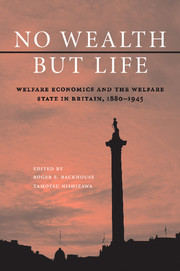1 - Introduction: Towards a Reinterpretation of the History of Welfare Economics
Published online by Cambridge University Press: 06 July 2010
Summary
PLACING WELFARE ECONOMICS IN CONTEXT
Towards the end of the 19th century, the laissez-faire ideology that had dominated Victorian Britain was increasingly called into question. There was great prosperity yet poverty remained endemic. London's poor East End was, for the middle classes, a dangerous foreign world quite unlike the areas in which they lived. Socialism was in the air. This term could denote a wide spectrum of positions, from Marxism and other forms of revolutionary socialism at one end to municipal socialism, centred on local authority provision of public goods and services, from sewers to street lighting, at the other. There were also important national initiatives in areas such as education. Such concerns were given impetus by the extension of the franchise to the working class, in 1867, 1884 and 1918, and by the rise of organised labour and the Labour movement, culminating in the displacement, in Parliament, of the Liberal Party by the Labour Party. Questions about the functioning of a capitalist economy became even more acute with the economic turmoil of the inter-war period, culminating in the Great Depression, when capitalism seemed, to many, to have failed. After 1917 there was, in the Union of Soviet Socialist Republics, an alternative with which comparisons could be made. However, as in the late 19th century, the issue facing most economists was not whether capitalism was so flawed that it needed to be overthrown but whether its faults could be put right by measures that fell far short of a Soviet-style command economy.
- Type
- Chapter
- Information
- No Wealth but LifeWelfare Economics and the Welfare State in Britain, 1880–1945, pp. 1 - 22Publisher: Cambridge University PressPrint publication year: 2010
References
- 5
- Cited by



